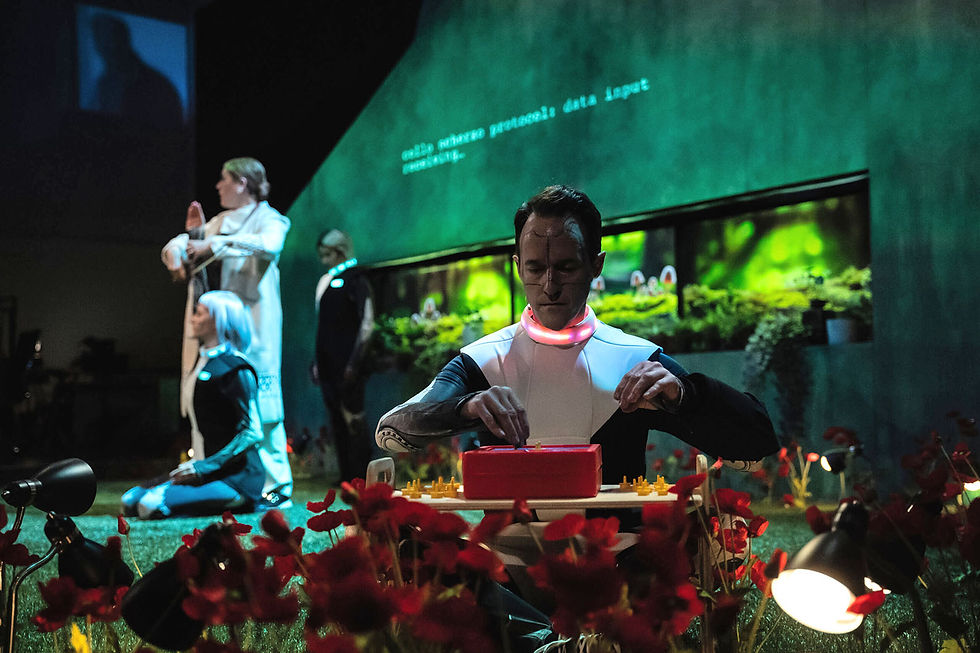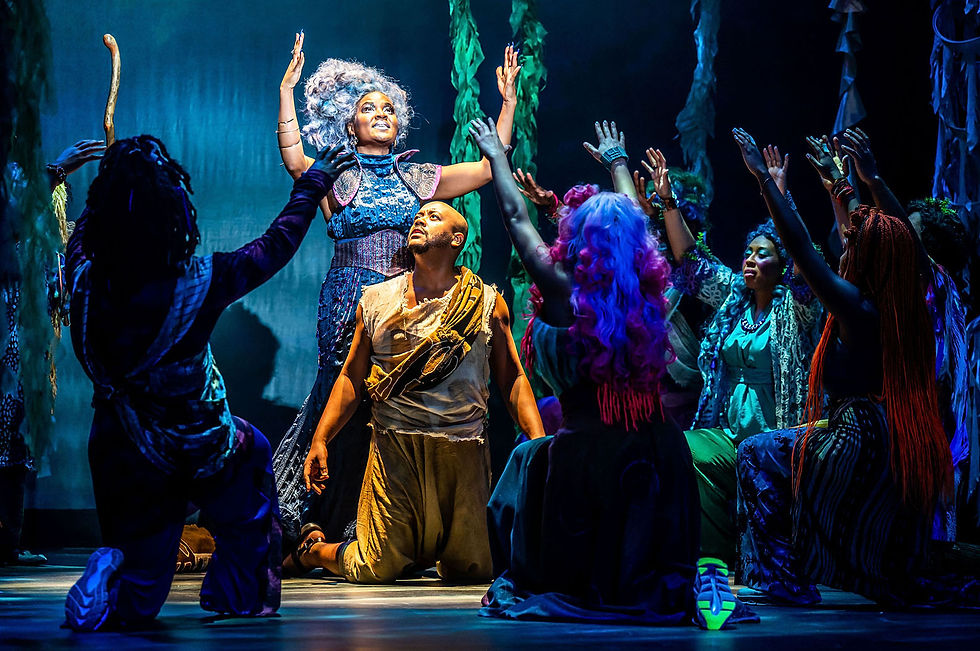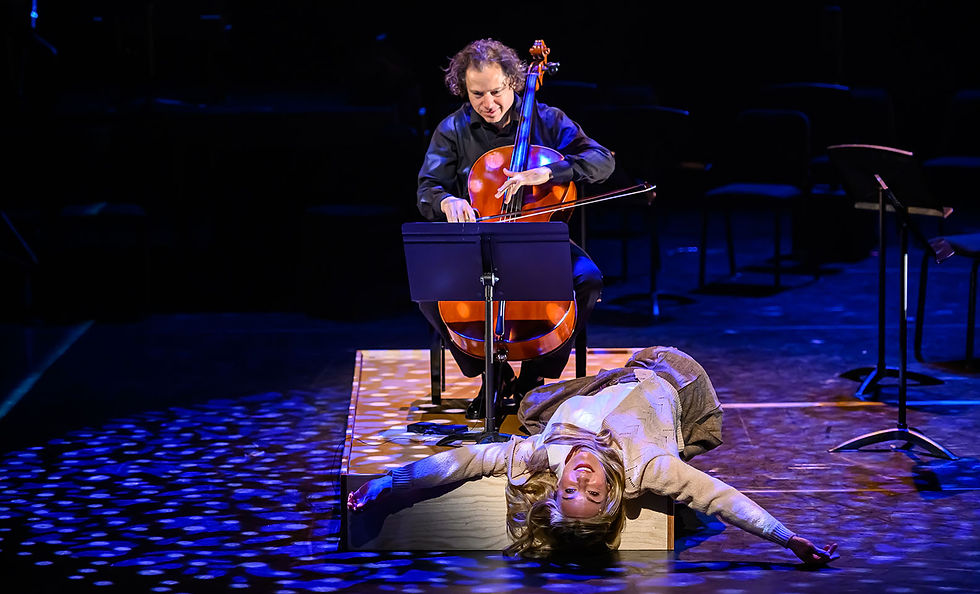A conversation with Tapestry Opera’s Artistic Director and Jacqueline stage director Michael Hidetoshi Mori, and West Edge Opera’s General Director Mark Streshinsky.
Hi Michael! Our West Edge Opera readers might not know that much about Tapestry Opera in Toronto. Can you describe what Tapestry Opera does, and its relationship to new opera?
MM: I can. Tapestry opera is a company that apologizes a lot, and says ‘Aboot’..
MS: (laughing) Leave that in!
MM: (laughing) Ok ok. Tapestry Opera is a company that commissions one to two pieces in a year, and premieres one to two pieces a year.
We do the full process - from developing creators, to commissioning creators, to workshopping their works, to premiering their works. We have partnered extensively in order to make this happen.
Among conventional opera and theater companies, we're a very audience-hungry company. Some people have the misconception that ‘opera’ is only the historical canon. What is thrilling to us is to show people that opera can be dramatic, dynamic, interesting and contemporary. And by contemporary, I mean: meaningful now.
Tapestry has been the flagship company for new Canadian opera in Canada for a long time. In our history, we've commissioned more than all the rest of the other Canadian opera companies combined.


Is there a lot of new opera happening in Canada?
MM: There's more happening now than 10 years ago when I started, that’s for sure. It's probably the same down in the U.S. as well - Canada is a pretty young country, like the U.S., and trying to understand itself.
We’re really only now developing our own Canadian creators, and not relying on the European canon or Europeans’ approval for knowing that what we are doing is something worthwhile.
I would say that Tapestry Opera is a company that fits halfway between the grand opera stage and a black box theater. We've done a ton of performance that's site specific - like a show with a Soprano climbing on a wall with aerialism, and another kind of ‘robot opera’ where we built wearable tech to tell the story of Rossum's Universal Robots and talk about the coming of AI. Our range is quite broad.
We're not dedicated to doing the aesthetic of anything over and over again. Rather, it's about discovery. How can we discover the stories that resonate? We aim to find the kind of music that, if our kind of Mozart was alive today, people in 200 years would look back and think: yes that is the sound of Toronto in the mid 2000’s.
Because, you know, Canada isn't just Drake and Justin Bieber!
Toronto is the most multicultural city in the world in terms of the people who live there. And so one of our inspirations is to draw from the great variety in artistic and musical backgrounds in order to inform the music and the theater that we do.
Yes, I imagine that Toronto and the Bay Area share a lot in terms of the diversity of audience.
MM: Yes! Except the Mexican food is way better in the Bay Area.
How did you come across Luna Pearl Woolf and Royce Vavrek’s Jacqueline?
MM: When I first started going to New York to see what was going on at the Prototype Festival, Beth Morrison said: you must know Royce Vavrek. He's the Canadian librettist who's written everything. And I said: I don't know him.
And then I looked it up and he'd never been performed in Canada! He’d already written 12 different operas that had premiered in the U.S…but not yet Canada. So I met him, we talked, and then Luna approached me with the idea of Jacqueline du Pre’s life as a drama… and it all just clicked. The idea tapped into something super - filled with exaltation and triumph and beauty and a story that you couldn't write if it hadn't happened.
Because at the time of Jacqueline’s career, it would have been impossible to imagine a woman becoming one of the four biggest classical music stars in the world as a soloist. But she did. She was.
And one of the clinchers was that cellist and collaborator Matt Haimovitz was one of Jacqueline du Pré's last students and was the first cellist to play with her husband Daniel Barenboim after Jacqueline got sick. Matt had a firsthand relationship with some of the most major players in Jacqueline’s life.
So here was a story that appealed to people who appreciate classical music, who will know all of the classical recordings that Jacqueline did, but at the same time a contemporary telling of that story: a duet between the soprano playing Jacqueline and the cellist playing the embodiment of her cello. As a director, that felt like such an exciting idea when the cello is such a part of her identity and then it's ripped away because of her illness, multiple sclerosis.
Mark, how did you come to hear about the production of Jacqueline? What got you up to Toronto?
MS: You know, I actually can't remember if it was Michael or Luna who first told me about it. I’d met Michael’s predecessor at Tapestry Opera, but as soon as I met Michael at one of the Opera America conferences, I felt like we just knew each other. And obviously the two companies had a lot in common.
I was already friends with composer Luna Pearl Woolf - we'd always see each other in New York in January during the Prototype Festival, and at conferences and forums.
The thing that first piqued my interest when I heard about Jacqueline is that I was a child cellist myself. I played Bach’s ‘Unaccompanied Cello Suites’ and I studied Jacqueline du Pré's recordings as I was learning them. I read about her, I definitely saw the movie Hillary and Jackie, and I was just always fascinated with her as a kind of tragic figure - a towering figure who was almost unintentionally so towering.
Hearing about the opera from Michael and Luna, and then knowing that Royce was doing the libretto - Royce and I are also old friends, and I directed the West Edge production of Breaking the Waves—which is a high point of my career …
And then finding out that Marnie Breckenridge was going to play ‘Jacqueline’! It felt like a bunch of good friends doing a great piece about a subject that really spoke to me. I was definitely going to go up to Toronto and see its premiere.
And I mean - at the end of watching it, I went right up to Luna and said ‘I want to do this’. Michael, how long did it take to develop it?
MM: I think we probably commissioned it in either late 2017 or early 2018. And it moved quickly because when Luna is determined, Luna will finish!
MS: Yes, we've had projects of hers on our winter showcase Snapshot. And she was also a part of our online composer and librettist resident program Aperture. She’s well-connected to West edge Opera.
MM: I remember in the development, we were in the middle of the Montana -
Montana?
MM: All of us involved in Jacqueline’s creative development went to Tippet Rise Arts Center in Fishtail, Montana. The people who used to own Gray Goose and a bunch of premium spirits sold their empire and they bought 17 ranches in Montana and combined them into one huge center.
There's cattle roaming around, and there's a Calder in the front of the ranch just sitting there…they have art pieces on loan from SFMoMA and they built enormous apartment building-sized sculptures out of concrete that are all over the hills - you feel like you're in a Martian landscape but you're also in the middle of Montana? It’s wild.
And at Tippet Rise, they built a beautiful concert hall there, so that people fly in to see shows during the summer.
Just google ‘Tippet Rise sculptures’ and you'll see some pretty wild images.
And the great thing is they have these cabins for artists to live in and each cabin is stocked with premium alcohol …and its own Steinway.
It's a weird sort of highbrow/lowbrow combination (laughing) and we had a great time developing the piece there.

We heard from our conversation with Marnie Breckenridge and Matt Haimovitz earlier this month about the opera’s reception in Toronto. From your point of view, how did audiences receive the opening of Jacqueline in March of 2020?
MM: Audiences in Toronto love this show. I think partly because so many people of a certain generation had been connected to Jacqueline and her story…
And partly because the combination of absolute virtuosity and inspiration required by Marnie and Matt in order to do those performances was just breathtaking. I did my best to create a beautiful frame around that so that it focused on the story of this tragic figure. I had an audience member say: ‘I come because I need a good cry’. She came to all four of the performances and just bawled each time.
Who knows what exactly is all true, but from our experience working on the piece, Jacqueline du Pré seemed like a pure person. She was like a muse who channeled whatever the divine was and turned it into such incredibly heartfelt, powerful cello music. People across the world were moved by her. And to see that cut so short in her mid-twenties, it's, it’s – heartbreaking…
It's opera.
MM: Right. That is the opera of it all. So in this production, to see her relationship with the cello personified by a human who gets to walk away from her…the story relying on the great virtuosity of these fantastic performers, but also on the core tenets of this truly operatic story…it's like the cello is alive and has a relationship with her.
MS: You talk about the virtuosity of the two, what's required of these two musicians. It's written specifically for Matt, right? What do you think about the future of this piece? I mean, the idea is for them to do it hopefully in many more performances before it's released to others, right?
MM: Yeah, I think so. Partly because they were as much a part of the development of the opera as anybody else. I don't know. I've seen this happen in other cases where, like Peter Pears is a good example. You write something for Extraordinary Tenor.
MS: Benjamin Britten's longtime partner and muse.
MM: Yeah. Who's gonna ever sing it like that? And then guess what? The world will try.
MS: And well, now we have several singers who specialize in Peter Pears roles.
MM: Right. So I want Matt to perform it as much as possible. But also, he is the trailblazer who says: "This is possible."
You both are leading companies that develop new opera. What do you see as the opportunities and the challenges or threats before you?
MS: Well, I can start off and say that Michael and I had this conversation maybe three, four years ago. I said: Hey, tell me about your funding. And said: You know, I get money from the government, right? So…that's a difference.
MM: Yeah, in terms of the viability, we get a good amount of funding from the government, particularly because we're focused on Canadian works. And that is helpful. We do raise as much as we can independent of that - we're just now in the middle of a $4 million dollar capital campaign for a space.
But to the point of your question…new and contemporary opera - meaning with the time and in the context of the world that we're living in - is what's really exciting to me because anyone can be into what we're doing if we do our job well.
If we give the right platform to the right artists who are thinking about what it means to be alive today and how should my art interact with that in different ways, that’s very exciting because I believe that audiences want experiences that transport them and make them laugh or cry, blown away by another's virtuosity.
I'm sure Mark would agree that not every show knocks it out of the park. Not every show even makes it to first base, when they do, it's amazing. And some of those audiences come up to me and say: I didn't know it could be like this. This is my first opera.
MS: I love it when people say that.
MM: And when people start coming back to see more shows, and when I see our audience looking more like a 30-to-50-year-old group because they're feeling something, not because they're loyal to a genre, that is really exciting.
MS: I remember that you were an early voice at Opera America conferences about representation and getting lived experiences in the room as things are being created. I listened to what you were saying and it made me reflect on what we had been doing and feel fairly proud about it, but really putting a sharper focus on the way I was thinking about contemporary opera.
I’ve got to thank you for that, because I think our commissions are reflecting more diverse lived experiences now.

Final question: is there anything you want to share with audiences coming in to see Jacqueline the first time? Something that you think might illuminate the way they first absorb the opera?
MM: The way this opera is written, it’s almost like a song cycle. There are different excerpts from different aspects of her life, different fantasies that she could be experiencing.
What goes through your head when you're trapped at home? At the very end of her life, her husband Daniel Barenboim's career had exploded, and she was alone at home with limited capacity, having only just years before been an international superstar.
Place yourself there. I find that can be an interesting way to look at all of the joyous moments in the first act of the opera - from the point of view of where the mind wanders when left alone.
Also, I kind of detest director's notes, and really I think you should just watch the show and enjoy its ride.
MS: Yeah I agree with that sentiment. Also, I will give one little pearl, perhaps a Luna “Pearl”...and that is that from my days as a young cellist, I remember very well the Elgar cello concerto. It just sticks in my mind from when I was a child.
After I saw the opera, I went up to Luna and I said: Luna, did you lift the Elgar? Did you actually just put the Elgar cello concerto into this opera? And she said: ‘No, no, I wrote my own Elgar cello concerto’.
MM: Yes, that is a ‘Pearl’ to listen for.










Comments